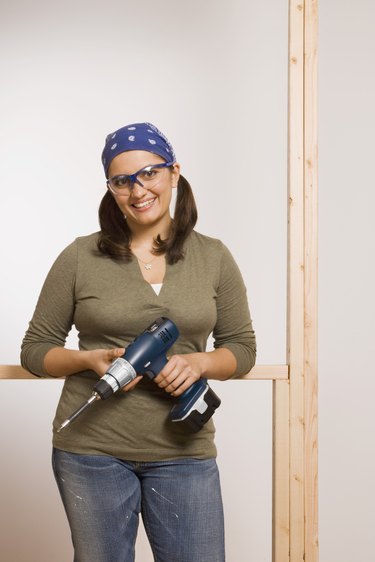
Drill bits are an integral feature of drilling tools. Drills may be powered by hand, electricity, or compressed air, but in all instances, their primary function is to create holes in building materials. Certain drill bits are for use in masonry, others for wood, still others for drilling holes through metal. Drill bits come in many designs: twist bit, wood auger, forstner, hole saw, flat wood, tile, countersink, bullet pilot, spur point and masonry. Parabolic drill bits refer to a specific bit design that has many benefits over other bit designs.
Design of Parabolic Drill Bits
Video of the Day
Drill bits come not only in different designs, but they are also made from somewhat varying materials. A twist bit is usually made of high speed steel. A masonry bit has a tip made from tungsten carbide. Spur point bits have a sharply pointed conical tip and edge grabbers that are especially effective in wood hole drilling. A parabola is a geometric shape based on an open plane curve with a very specific set of points to the curve. When a parabolic shape is incorporated into a drill bit — not just on the tip but along the length of the bit — certain advantages over other designs become apparent.
Video of the Day
Primary Uses of Parabolic Drill Bits
Parabolic drill bits can be used for any number of home improvements projects. They come in a range of sizes, from one-sixteenth inch to over an inch in diameter. They can drill starter holes for screws, partial holes for dowels and clear holes for bolts. However, parabolic drill bits are most often used for deep hole drilling.
Comparative Advantages of Parabolic Drill Bits
Due to their unique design, parabolic drill bits drill holes faster than other drill models. The parabolic spiral allows chips to flow up quickly, not blocking the hole or requiring frequent drill bit withdrawal to clean out wood chips. Parabolic drill bits rarely shred the area surrounding entry and exit holes, leaving less damage to be corrected after drilling. Parabolic drill bits last a long time, with breakage a problem only with the smallest bits (under three-sixteenth inch in diameter).
Potential Draw-Backs to Parabolic Drill Bits
When drilling through thin sheet metal, parabolic drills with flute design can corkscrew, leaving uneven edges. Users can minimize this problem by rigidly holding the drill in place when drilling. The design of the parabolic drill tip makes it hard to grab and stay in place when drilling through metals. Making a dimple with a hammer and eight-penny nail can serve as a starter point for the drill tip. The parabolic drill tip can also slip on wood surfaces; again, the key is to hold it rigidly and drill slowly until the tip grabs the material.